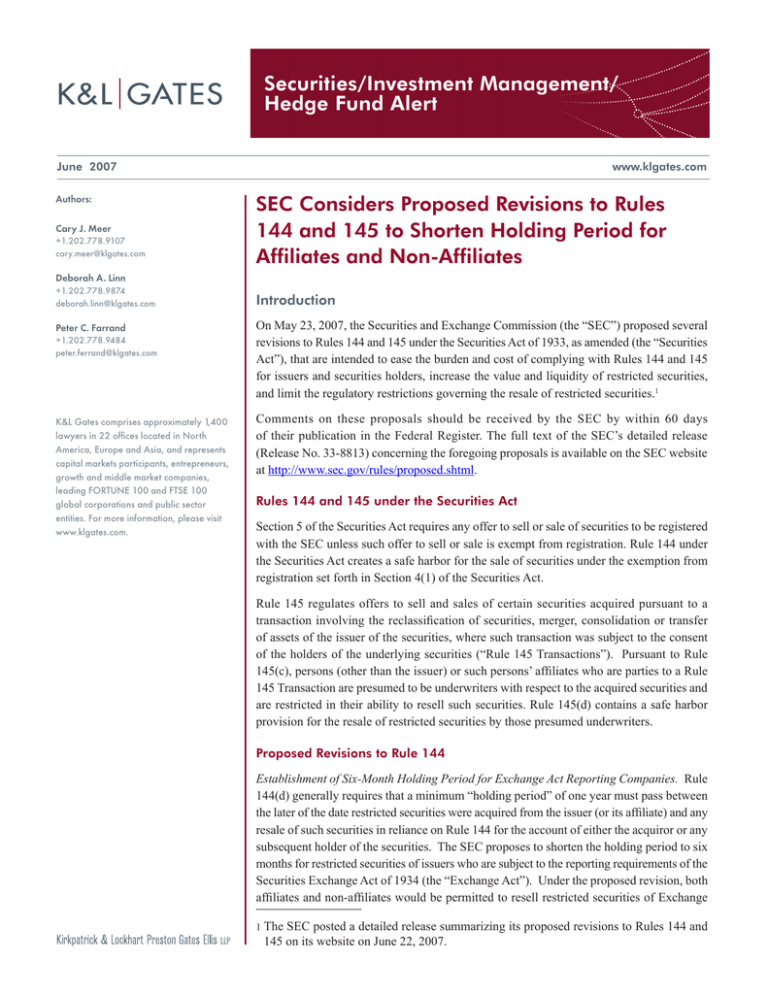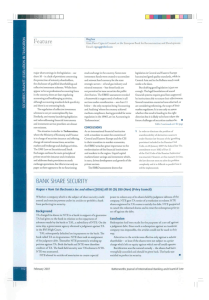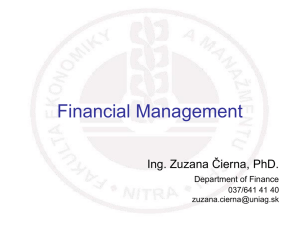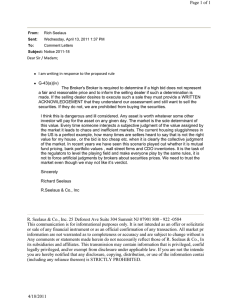
Securities/Investment Management/
Hedge Fund Alert
June 2007
Authors:
Cary J. Meer
+1.202.778.9107
cary.meer@klgates.com
www.klgates.com
SEC Considers Proposed Revisions to Rules
144 and 145 to Shorten Holding Period for
Affiliates and Non-Affiliates
Deborah A. Linn
+1.202.778.9874
deborah.linn@klgates.com
Peter C. Farrand
+1.202.778.9484
peter.ferrand@klgates.com
K&L Gates comprises approximately 1,400
lawyers in 22 offices located in North
America, Europe and Asia, and represents
capital markets participants, entrepreneurs,
growth and middle market companies,
leading FORTUNE 100 and FTSE 100
global corporations and public sector
entities. For more information, please visit
www.klgates.com.
Introduction
On May 23, 2007, the Securities and Exchange Commission (the “SEC”) proposed several
revisions to Rules 144 and 145 under the Securities Act of 1933, as amended (the “Securities
Act”), that are intended to ease the burden and cost of complying with Rules 144 and 145
for issuers and securities holders, increase the value and liquidity of restricted securities,
and limit the regulatory restrictions governing the resale of restricted securities.
Comments on these proposals should be received by the SEC by within 60 days
of their publication in the Federal Register. The full text of the SEC’s detailed release
(Release No. 33-8813) concerning the foregoing proposals is available on the SEC website
at http://www.sec.gov/rules/proposed.shtml.
Rules 144 and 145 under the Securities Act
Section 5 of the Securities Act requires any offer to sell or sale of securities to be registered
with the SEC unless such offer to sell or sale is exempt from registration. Rule 144 under
the Securities Act creates a safe harbor for the sale of securities under the exemption from
registration set forth in Section 4(1) of the Securities Act.
Rule 145 regulates offers to sell and sales of certain securities acquired pursuant to a
transaction involving the reclassification of securities, merger, consolidation or transfer
of assets of the issuer of the securities, where such transaction was subject to the consent
of the holders of the underlying securities (“Rule 145 Transactions”). Pursuant to Rule
145(c), persons (other than the issuer) or such persons’ affiliates who are parties to a Rule
145 Transaction are presumed to be underwriters with respect to the acquired securities and
are restricted in their ability to resell such securities. Rule 145(d) contains a safe harbor
provision for the resale of restricted securities by those presumed underwriters.
Proposed Revisions to Rule 144
Establishment of Six-Month Holding Period for Exchange Act Reporting Companies. Rule
144(d) generally requires that a minimum “holding period” of one year must pass between
the later of the date restricted securities were acquired from the issuer (or its affiliate) and any
resale of such securities in reliance on Rule 144 for the account of either the acquiror or any
subsequent holder of the securities. The SEC proposes to shorten the holding period to six
months for restricted securities of issuers who are subject to the reporting requirements of the
Securities Exchange Act of 1934 (the “Exchange Act”). Under the proposed revision, both
affiliates and non-affiliates would be permitted to resell restricted securities of Exchange
The
SEC posted a detailed release summarizing its proposed revisions to Rules 144 and
145 on its website on June 22, 2007.
Securities/Investment Management/
Hedge Fund Alert
Act reporting companies (a “Reporting Company”)
publicly after holding the securities for six months,
subject to the other resale requirements of Rule 144
and subject to a tolling provision in certain instances
(discussed below). A one-year holding period would
continue to apply to restricted securities of companies
that are not Reporting Companies.
The reduction in the holding period for restricted
securities of Reporting Companies will benefit holders
of such securities by increasing the liquidity of those
securities.
Tolling Provision. The proposed tolling provision
would suspend the minimum holding period (i.e.,
six months) applicable to restricted securities of a
Reporting Company while the holder of the securities
(or the previous owner of the securities) engaged
in certain hedging transactions (e.g., equity swap
agreements, single stock futures, short sales) involving
the securities. The proposed tolling provision would
not apply if the holder holds the securities for a period
of at least one year, regardless of any hedging activity
by the holder (or the previous owner of the securities)
during such one-year period. As originally adopted
in 1972, Rule 144 tolled the holding period during
hedging transactions. Such tolling provisions were
eliminated in 1990. The proposed tolling provision is
the only proposed provision whose purpose is not to
make it easier to sell. However, since the tolling would
not apply to securities held at least one year, the net
effect is that, at worst, resales will not be delayed any
longer than they are under the current rule.
Reduction of Rule 144 Requirements Applicable to
Non-Affiliates. Rule 144(d) requires non-affiliates to
hold their restricted securities for a minimum of one
year before they may resell those securities. Once the
minimum holding period has been met, a non-affiliate
may resell his or her restricted securities publicly,
A
sale of restricted securities made in reliance
on Rule 144 must comply with Rule 144’s resale
requirements, which include a minimum holding
period applicable to the securities, a requirement that
current public information with respect to the issuer
of the securities is available at the time of the resale,
volume of sale limitations, manner of sale limitations
and a notice of sale requirement.
provided that he or she complies with the resale
requirements of Rule 144. Generally, a non-affiliate
may resell his or her restricted securities without
limitation if the non-affiliate has held the securities
for at least two years.
The SEC proposes to reduce or eliminate the Rule
144 holding periods and resale restrictions applicable
to non-affiliates. A non-affiliate who holds restricted
securities of a Reporting Company would be able to
freely resell the securities after the six-month holding
period has been met (subject to the tolling provision
discussed above), provided that any such resale would
be subject to Rule 144(c)’s requirement that current
public information regarding the issuer of the securities
is available. A non-affiliate would be able to resell
his or her restricted securities (regardless of whether
the issuer of the securities is a Reporting Company)
without limitation if he or she has held the securities
for at least one year.
Sale of Debt Securities by Affiliates. Rule 144(f)
establishes the “manner of sale” requirements for the
resale of restricted securities during a period when
the requirements of Rule 144 still apply. Generally,
a person selling restricted securities may not solicit
orders to purchase the securities or make any payment
in connection with the offer or sale of the securities
to any person other than the broker who executes
the order to sell the securities. The SEC proposes to
eliminate Rule 144(f)’s “manner of sale” requirements
with respect to the sale by affiliates of debt securities
(e.g., fixed income securities). The Rule 144(f)
definition of “debt securities” would include securities
that have “debt-like” characteristics, such as assetbacked securities and non-participating preferred
stock. If enacted, this proposal would allow holders of
debt securities greater flexibility in the resale of such
securities, including the option to privately negotiate
the resale of the securities.
Revisions to Form 144. Under this proposal, the
thresholds that trigger the Form 144 filing requirement
would be increased from 500 shares (or other units
of interest) and an aggregate sale price of $10,000 or
more to 1,000 shares (or other units of interest) and an
aggregate sale price of $50,000 or more, respectively.
Furthermore, non-affiliates would no longer be required
June 2007 | Securities/Investment Management/
Hedge Fund Alert
to file a Form 144 in connection with their sales of
restricted securities.
pledgor as long as there is no concerted action by
those pledgees.
Codification of Certain SEC Interpretive Positions
Regarding Rule 144. The SEC intends to codify
several of its interpretive positions relating to Rule
144. Although these proposed codifications will not
substantively change Rule 144, they would provide
additional guidance and clarification with respect
to specific provisions of Rule 144. These proposals
include:
•A
mending Rule 144 to expressly state that it is
not available for the resale of securities issued by
issuers, other than asset-backed issuers and business
combination related shell companies, that are “shell
companies” including “blank check” companies.
Once the shell company has ceased to be such
and at least 90 days has passed since the filing of
information with the SEC indicating that the shell
company is no longer a shell company, Rule 144 is
available.
•A
mending the definition of “restricted securities”
under Rule 144(a)(3) to include securities acquired
from an issuer pursuant to an exemption from
registration under Section 4(6) of the Securities
Act.
•A
mending Rule 144(d) to permit holders of
restricted securities, subject to certain conditions,
to “tack” the Rule 144 holding period in connection
with transactions made solely to form a holding
company.
•A
mending Rule 144(d) to permit the “tacking” of
the Rule 144 holding period in connection with
conversions or exchanges of securities where the
holder acquired securities from the issuer solely in
exchange for other securities of the same issuer.
•A
mending Rule 144(d) to provide that, upon a
cashless exercise of options or warrants, the newly
acquired underlying securities are deemed to have
been acquired when the corresponding options
or warrants were acquired, even if the options or
warrants originally did not provide for cashless
exercise by their terms.
•A
dding an interpretive note to Rule 144(e)(2)(ii) that
would permit a pledgee to sell pledged securities
without having to aggregate the sale with sales by
other pledgees of the same securities from the same
ection 4(6) of the Securities Act provides an
S
exemption from registration for an offering made
only to accredited investors that does not exceed $5
million, does not involve any advertising or public
solicitation by the issuer or anyone acting on the
issuer’s behalf, and for which a Form D has been
filed with the SEC.
•A
mending Form 144 to reconcile the security holder’s
representation in Form 144 with Rule 10b5-1(c)’s
affirmative defense language – that a person’s sale of
restricted securities was not on the basis of material
nonpublic information.
Modifications to Preliminary Note to Rule 144;
Solicitation of Comments on Additional Proposals
to Amend Rule 144. The SEC proposes to revise the
Preliminary Note to Rule 144 using plain English
principles. The SEC is also soliciting comments on
whether to coordinate the Form 144 filing requirements
A
“business combination related shell company”
is a shell company (as defined in Rule 405 under
the Securities Act) that is (1) formed by an entity
that is not a shell company solely for the purpose of
changing the corporate domicile of that entity solely
within the United States; or (ii) formed by an entity
that is not a shell company solely for the purpose
of completing a business combination transaction
(as defined in Rule 230.165(f)) among one or more
entities other than the shell company, none of which
is a shell company.
A
“shell company” is a registrant, other than an
“asset-backed issuer,” that has: (1) no nominal
operations; and (2) either (i) no or nominal assets; (ii)
assets consisting solely of cash and cash equivalents;
or (iii) assets consisting of any amount of cash and
cash equivalents and nominal other assets.
A “blank check” company is a company that: (i) is in
the development stage; (ii) has no specific business
plan or purpose, or has indicated that its business
plan is to merge with or acquire an unidentified third
party; and (iii) issues penny stock.
June 2007 | Securities/Investment Management/
Hedge Fund Alert
with the Form 4 filing requirements under Section 16 of
the Exchange Act. The SEC is also soliciting comments
on whether it should revise Item 701 of Regulation S-K
to require additional disclosure about the resale status
of securities issued in unregistered transactions at the
time the issuer first issues the securities.
Proposed Revisions to Rule 145
This proposal would eliminate the presumed underwriter
and resale provisions in Rule 145(c) and (d), except
with regard to Rule 145 Transactions involving shell
companies (other than business combination related
shell companies). Thus, only parties to a Rule 145
Transaction that involved a shell company (other than a
business combination related shell company) would be
deemed presumed underwriters of the transaction. This
proposal would also harmonize the resale restrictions
of Rule 145(d) with the proposed revisions to Rule 144
that apply to the resale of securities of shell companies
(discussed above).
K&L Gates comprises multiple affiliated partnerships: a limited liability partnership with the full name Kirkpatrick & Lockhart Preston Gates Ellis LLP qualified
in Delaware and maintaining offices throughout the U.S., in Berlin, and in Beijing (Kirkpatrick & Lockhart Preston Gates Ellis LLP Beijing Representative
Office); a limited liability partnership (also named Kirkpatrick & Lockhart Preston Gates Ellis LLP) incorporated in England and maintaining our London
office; a Taiwan general partnership (Kirkpatrick & Lockhart Preston Gates Ellis) which practices from our Taipei office; and a Hong Kong general
partnership (Kirkpatrick & Lockhart Preston Gates Ellis, Solicitors) which practices from our Hong Kong office. K&L Gates maintains appropriate registrations
in the jurisdictions in which its offices are located. A list of the partners in each entity is available for inspection at any K&L Gates office.
This publication/newsletter is for informational purposes and does not contain or convey legal advice. The information herein should not be used or relied
upon in regard to any particular facts or circumstances without first consulting a lawyer.
Data Protection Act 1998—We may contact you from time to time with information on Kirkpatrick & Lockhart Preston Gates Ellis LLP seminars and with our
regular newsletters, which may be of interest to you. We will not provide your details to any third parties. Please e-mail london@klgates.com if you would
prefer not to receive this information.
©1996-2007 Kirkpatrick & Lockhart Preston Gates Ellis LLP. All Rights Reserved.
June 2007 |




